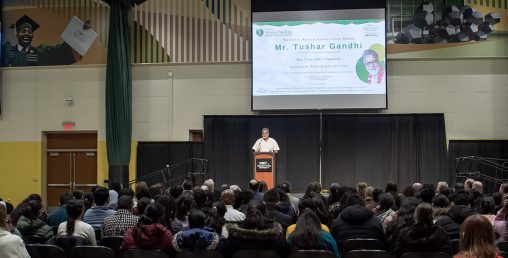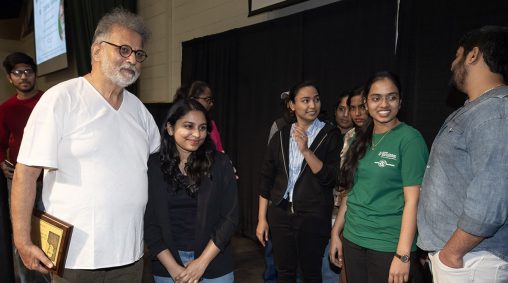Tushar Gandhi told a Wright State University audience of more than 300 on Jan. 31 a little-known fact about his famous great-grandfather, Mahatma Gandhi: He yearned to be a doctor.
However, the strict conservativism of Gandhi’s family beliefs — that touching the bones, tissues and blood of another was wrong — ended that dream. But that didn’t stop Gandhi from tending to wounded behind battle lines while siding with then-British rulers.
Such was how Tushar Gandhi opened his talk as the Earl H. Morris, M.D., Endowed Lectureship speaker in the Apollo Room of the Student Union.
In his lecture, “Global Health Disparities in Underserved Communities,” Gandhi, a writer and director of the Gandhi Research Foundation, focused on his knowledge of health care disparities in his native country.
Disparate they are, he said, noting the good care he received in his hometown of Mumbai during the COVID-19 pandemic and the poor care people in rural India received.
“People were being treated in ambulances in hospital parking lots because there were no beds available,” he said. “Many families tragically lost loved ones.”
He also noted that rural India’s poor water quality and lack of infrastructure, especially roads, contribute to the lack of good health care as compared to that in the cities.
While focusing primarily on conditions in India, Gandhi said the issue of providing proper health care is not a problem for nations, but for humanity.

Tushar Gandhi, the great-grandson of Mahatma Gandhi, discussed health care disparities during the Earl H. Morris, M.D., Endowed Lecture at Wright State. (Video by Kris Sproles / photos by Erin Pence)
In a question-and-answer session afterward, he addressed a concern among many collegians: repaying student loans. He told the audience, mostly students, not to succumb to the anxiety of future loan repayments but to focus on getting a good education here and now, which is why they came to a university such as Wright State.
Sankhadip Bhadra, a second-year biomedical sciences Ph.D. student who was in the audience, said afterward he was comforted by Gandhi’s suggestion about focusing on education and gaining knowledge now.
“Wright State has such a big population of students from India studying over here to escape the oppressive educational system in India that doesn’t allow them to flourish,” Gandhi told local media members following his lecture.
He also lauded educational institutions in the United States like Wright State.
“Because of the importance they put on the student. In India, it doesn’t happen that way,” he said, adding that it takes a heavy toll on Indian students.
Gandhi’s lecture was well-received.
“I was excited to see him and meet him and hear about the Gandhi legacy,” Rajan Hirani, a 2023 graduate, said. “It was a wonderful experience.”
“The great thing about this event was that Wright State brought a world-renowned humanitarian to our campus,” said Iwona Goodrich, a graduate public health student. “I felt an overwhelming sense of gratitude for being involved with this wonderful experience.”
Gandhi spent the rest of his day on the Dayton Campus visiting with Wright State administrators, staff and students.

Tushar Gandhi visited with students during his daylong visit to Wright State’s Dayton Campus on Jan. 31.
Since his arrival in the Dayton area on Jan. 19, he visited several places of history and interest in the Dayton area, including the International Peace Museum, Wright brothers and Paul Laurence Dunbar sites, and the National Museum of the U.S. Air Force.
“Dayton has been nice, despite the weather and the cold,” Gandhi said. “The experience has been very nice.”
His lasting message is that each person can make a positive difference.
“Just do whatever you can. Nothing you do is insignificant,” he said.

 Walking through open doors
Walking through open doors  Adventures await
Adventures await  Wright State to expand nursing facilities to meet workforce needs and prepare more graduates for in-demand careers
Wright State to expand nursing facilities to meet workforce needs and prepare more graduates for in-demand careers  Wright State student-athletes make a lasting impact on local family with more to come
Wright State student-athletes make a lasting impact on local family with more to come  Wright State names Rajneesh Suri dean of Raj Soin College of Business
Wright State names Rajneesh Suri dean of Raj Soin College of Business 